|
(English translation below)
Es increíble cómo el tiempo vuela y lo mucho que puede pasar en ciertos periodos de tiempo. Hace 11 semanas y 2 días exactamente que empecé una nueva aventura siguiendo a mi corazón e intentando seguir los pasos y el ejemplo de quien dio su vida por nosotros. Estoy viviendo en Tucson, Arizona siendo parte de un programa de jóvenes voluntarios llamado «Young Adult Volunteers (YAV program)» De la Iglesia Presbiteriana en los Estados Unidos, programa del que supe luego de vivir un año en Agua Prieta, Sonora haciendo parte de otro programa de servicio y qué loco ¿no? lo que hoy decidimos hacer, es justo lo que nos va a llevar hacia nuestro futuro. Esto no estaba en mis planes, pero vivo agradecida porque Dios siempre me lleva de la mano, me lleva hacia las personas correctas y abre puertas llenas de oportunidades para mí. Durante este tiempo he tenido la oportunidad de regresar a Agua Prieta, visitar a los amigos que hice y a mi familia en la frontera, algo que sin duda me hace muy feliz. Actualmente estoy trabajando con una maravillosa organización sin fines de lucro llamada «Community Home Repair Projects of Arizona (CHRPA)». En resumidas palabras y desde mi conocimiento, CHRPA es un puente y un actor importante en la realización de servicios de reparación en casas de personas de escasos recursos en la ciudad de Tucson y el Condado Pima. Los trabajos que se realizan son relacionados a la plomería, electricidad, carpintería y muchas cosas más, ¿y qué creen? yo estoy aprendiendo un poquito de todo eso y aportando mis ganas de querer hacer y aprender, pero algo que quiero destacar es que además de brindar una solución a las facturas de electricidad tan altas o a los riesgos que la falta de alguna cosa puede traer a una persona mayor de edad, es que realmente importa mucho el bienestar integral de los clientes a quienes servimos, también es nuestro objetivo escucharlos o hacerlos sentir que sus necesidades o sus historias son muy importantes. Nunca antes me vi haciendo todo lo que he hecho en las últimas semanas, reparando las llaves de una ducha, reparando o instalando nuevos boilers, construyendo rampas o escalones, subiéndome a techos para tratar de encontrar y arreglar el problema en el enfriador de la casa, usando herramientas de las que ni siquiera sabía el nombre en español, poniendo nueva cerámica en un baño… demasiadas cosas nuevas y además, en un idioma que no es mi primer idioma. He tenido mucho cansancio físico y mental, pero estoy feliz y mi estómago se llena de muchas mariposas por lo mucho que me emociona estar haciendo todo esto, aprendiendo tanto y poniéndome al servicio de quienes se benefician con nuestro trabajo, personas que sin duda necesitan de algo que a lo mejor para mí no es tan grande pero que para ellos significa seguridad y tranquilidad, y quién no quiere eso ¿no? Así que aquí estoy, extrañando a mi familia y a mis amigos en El Salvador, pero satisfecha por estar viviendo la vida que yo elijo y que mi corazón me dice que está bien, porque además, sé que no estoy sola y que Dios siempre cuida de mí. Guardo en mi corazón estos versículos en Romanos 8:38-39 38 “Por lo cual estoy seguro de que ni la muerte, ni la vida, ni ángeles, ni principados, ni potestades, ni lo presente, ni lo por venir, 39 ni lo alto, ni lo profundo, ni ninguna otra cosa creada nos podrá separar del amor de Dios, que es en Cristo Jesús Señor nuestro.” Ninguna dificultad podrá apartarme de ese amor incondicional para mí, y es por eso que descanso tranquilamente en Él. It's amazing how time flies and how much can happen in certain periods of time. Exactly 11 weeks and 2 days ago I started a new adventure following my heart and trying to follow the steps and example of someone who gave his life for us. I am living in Tucson, Arizona being part of a young adult volunteer program called "Young Adult Volunteers (YAV program)" from the Presbyterian Church in the United States, a program that I learned about after living a year in Agua Prieta, Sonora as part of another service program and how crazy, right? What we decide to do today is exactly what will take us towards our future. This was not in my plans, but I am grateful because God always takes me by the hand, leads me to the right people and opens doors full of opportunities for me. During this time I have had the opportunity to return to Agua Prieta, visit the friends I made and my family on the border, something that undoubtedly makes me very happy. I am currently working with a wonderful non-profit organization called “Community Home Repair Projects of Arizona (CHRPA).” In short and from my knowledge, CHRPA is a bridge and an important actor in providing repair services to the homes of low-income people in the city of Tucson and Pima County. The work carried out is related to plumbing, electricity, carpentry and many other things, and what do you think? I am learning a little about all that and contributing my desire to want to do and learn, but something I want to highlight is that in addition to providing a solution to high electricity bills or the risks to a person of an older age, is that the comprehensive well-being of the clients we serve really matters a lot, it is also our goal to listen to them or make them feel that their needs or their stories are very important. Never before have I seen myself doing everything I have done in recent weeks, repairing shower faucets, repairing or installing new boilers, building ramps or steps, climbing on roofs to try to find and fix the problem in a cooler, using tools that I didn't even know the name of in Spanish, putting new tiles in a bathroom... too many new things and also, in a language that is not my first language. I have had a lot of physical and mental fatigue, but I am happy and my stomach is filled with many butterflies because I am so excited to be doing all this, learning so much and putting myself at the service of those who benefit from our work, people who undoubtedly need help. Something that maybe for me is not that big but for them it means security and tranquility, and who doesn't want that, right? So here I am, missing my family and friends in El Salvador, but satisfied to be living the life that I choose and that my heart tells me is right, because also, I know that I am not alone and that God always takes care of me. my. I keep these verses in my heart in Romans 8:38-39 38 “For I am sure that neither death, nor life, nor angels, nor principalities, nor powers, nor things present, nor things to come, nor height, nor depth, nor any other created thing, can separate from the love of God, which is in Christ Jesus our Lord.” No difficulty can separate me from that unconditional love for me, and that is why I rest peacefully in God.
0 Comments
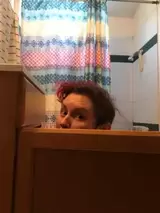 Toilet replacements are unpredictable. Sometimes it is simple, take one out, put one in, no worries. Other times there are many more steps such as repairing the floor. Or fixing the flange. Or replacing the water shut off valve. All of these involve many extra steps and materials Vernon, another CHRPA volunteer, and I embarked on a toilet replacement job one Thursday afternoon not knowing what we would find. Upon walking into the small bathroom, we were relieved to find that all seemed to be in good shape. This could be a simple replacement of the toilet, with no extra steps needed. I detached the existing toilet while Vernon brought the new one in from the van. In no time, we had the old one out and the new one set in place. I knelt over it to tighten the bowl to the floor. The left bolt was tight and the right one was almost there. I thought to myself “2 more turns of the nut should get it tight” but on that second turn, I heard an unexpected sound. “POP!” Oh no… The bolt on the right side had come loose under the toilet… to fix that required removing the toilet bowl, re-securing the bolt, and putting the toilet back on, hoping it worked the second time. Vernon’s experience and ingenuity helped us. He secured the bolt that had come loose with an extra washer. We put the toilet back in place. Vernon tightened the pesky bolt on the right as we held our breath, hoping this time it would work. It did! But as he tightened the bolt on the left, we heard that same, unwanted sound… “POP!” The bolt on the left had come loose. By this point the small bathroom was hot. Every minute that passed I seemed to notice more of how tiny the space was. We had been in there about an hour and a half. We were tired after a long week of repairs and very ready for the weekend to begin. But we couldn’t just leave it. So again we removed the toilet… Vernon put an extra washer on that bolt as well and we set the toilet back in its place for a third time. Vernon tightened the bolts while I crossed my fingers and prayed it would stay secure. Luckily, the third time really was the charm. Feeling grateful for those extra bolts, we got everything hooked up and running. As we cleaned up our tools, I felt frustrated by how long it took us to do that job. I was just happy it was done and I could get ice cream when I returned to the office, I grabbed the file out of the truck to get the client’s signature before leaving. Inside the house, I told them about the mishaps we encountered and explained why I had needed to go in and out of the house about five times to grab more tools and supplies from the truck. Our client laughed with me and then told me. “My 4 year old granddaughter who is playing in the other room saw you coming in and out. She said ‘how can a girl be fixing the toilet?’ with a confused look on her face. I told her that girls can do anything. That she can do anything. You are an example of that for her.” I didn’t know how to respond. I was sweaty and tired, but those few sentences reminded me how life giving it is to do this work and how grateful I am to have wonderful people at CHRPA to teach me the tools of the trade. I felt grateful to all the women who have empowered me to do whatever I dream of, knowing that nothing will hold me back. I felt humbled to be this example for a child. As we drove away, I still felt frustrated. I was still ready for my ice cream. But I also was smiling because I knew that that girl might just believe in herself and her dreams a little bit more, just from seeing me carry a toilet. Abi and I walked into a local family owned plumbing store in town. Compared to Naughton’s and Home Depot this store is tiny, instead of roaming through the aisles to find plumbing parts, you walk up to the counter and ask Bruce for what you need. He brings it right to you. There is free cold water to make sure plumbers are staying hydrated. Abi and I walked into Bonnets, Stems, and Accessories to find a Price Pfister shower valve, we were excited to walk in, knowing the service would be so friendly and the store would more likely have the part we needed that is harder to find at other stores. A man walked into this same plumbing store and was not expecting to see two females in this plumbing small store. Once again unlike Naughton’s or Home Depot we were in close proximity he didn’t see us walking down the aisle where he could, just quietly wonder what we were trying to find at Home Depot, keeping his comments to himself. A man walked into this small store and before the door even closed Abi and I hear this man ask “are y’all female plumbers.. I didn’t know there were female plumbers?” We had just told Bruce what we needed and he had turned to look at his stock, but as soon as he heard this man’s comment he turned back around and let this man know, actually there are quite a bit of female plumbers. In fact Bruce’s mom has been in construction since the 80’s here and has had to have “bigger balls” than all the men in this field. Bruce told him that men learned quickly to be “more afraid of her than an 80 pound bulldog,” she meant business and knew what she was doing. This man of course was shocked to hear that women were in this field, but he figured out it did make sense that women could do plumbing now, after all technology and tools have really developed to make it easy enough now for women to do plumbing. This has been the most direct comment from a man I’ve heard in my six months in this male dominated field of home repair and construction, questioning the ability of females to do the same work he does, just as well as he can. Many people seem shocked to see that women are in this field. Some comments men make are more subtle when they are curious about women in this field. We have many questions about whether or not we are the crew that will do the work, or if we are just the assessors. We are often asked if we need help loading lumber onto our rack when we have five boards left after already loading our first twenty boards on our own. These comments don’t always sound like they are questioning our ability to do these things on our own, but also when I’m paired with male staff, I don’t receive these same questions. I am just left to wonder what assumptions or expectations are being made by men about me in this field. 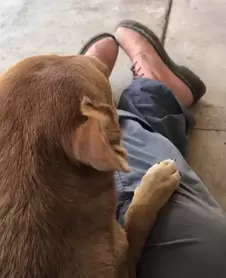 My pink boots and pups are the best part of the job My pink boots and pups are the best part of the job Despite these comments in only six months I’ve started to gain confidence in my abilities, I’ve installed a handful of furnaces and water heaters, I have helped build the longest ramp that CHRPA has built, I’ve installed many kitchen and lav faucets and re-plumbed leaking water lines. I’ve learned how to use the many tools that do in fact make the job easier; I’ve learned how to use pipe wrenches, snakes, a rehau and wirsbo, and how to solder. These make it easy to make connections in water lines, and be able to do work faster. I love working in a field that hasn’t traditionally been male dominated. I love getting to use power tools that make me feel empowered. I love working with other women in the field. I love wearing my pink work boots that make me feel like I can express my gender and the pride I have in being a woman. I love when female clients we work for are comforted by the fact that women are coming into their homes to help them. I love that female clients think we’re badass and rooting us on when we’re working. The smallest moments with female clients are truly special, they remind me of the many other times in my life I have felt surrounded by sisterhood. The community I have found with women in my life has been incredibly healing and powerful in not allowing me to feel alone. The comments and feeling uncomfortable with some of the men I interact with in this field still at times is something I continue to struggle with, but finding community with women within my work brings me joy, and the desire to continue to use my strengths and abilities as a women. As a Tucson Borderland YAV at the beginning of the year I got to pick out my very own bike and helmet that has become my main mode of transportation around the city. This was perhaps one of the things I felt most hesitant about coming to Tucson, I have never really liked biking. I was uncomfortable feeling unbalanced as well as not feeling in control of the speed of my body. I got a pretty cool bike; we took a bike safety class, and I’ve been riding almost everyday since I got my bike. I feel much more comfortable, even confident on my bike. And I am actually loving biking! When we took our bike safety class we learned about the ABC Quick ✓, which a good bicyclist will do before each ride. ABC Quick ✓ stands for Air, Brakes, Chains (or cranks and cassette) Quick releases, and yay all checked, ready to ride! I’m going to go through a little different ABC Quick ✓ to give a little bit of a glimpse of my everyday with my beloved bike.
ABC Quick ✓ No Air in My Tires… Every so often in the desert little goat-heads, love to get in my tires. I’ve fixed more than a handful of flat tires in the few months I’ve had biking as my main mode of transportation. Just last week I was looking at my tire and pulled out a goat-head and immediately heard a hissing sound come from my bike. Inside of bike tires are tubes that get pumped up with air, so when there’s a hole from whatever pokey thing I’ve ran over in the desert I remove the tube and put a patch to seal up the hole. The tube is good as new. Sometimes the hole is hard to find, and one of the easiest ways to find the hole is with a bucket of water. First you fill the tube up with air and then submerge part of the tube and work your way around the tube until a stream of bubbles starts coming from the tube. Flat tires will sometimes come at the most inconvenient times, especially when me and Laura are ready to head to work or partially through our uphill morning ride adding some extra effort for my legs. However some of the fun moments in changing flat tires is sitting in the living room the night before an early morning ride, while my roommates sitting on our couches. Our bikes, including the many pesky flat tires is a big part of community life. Break Though biking doesn’t give most my muscles a rest, it gives my brain a break. Growing up as an athlete being able to be active has always been a space for me to process or just get completely out of my head. Biking after a long day of work gives me time to decompress, listen to music, and talk to my housemate Laura. Recently we had a week of border delegations, which was a very powerful and emotional week that I hope to blog about when I can find the words to explain the experience. We were in Agua Prieta for half a week and then returned to Tucson to continue learning about different organizations that are doing work with the border and immigration. I was so excited to be back with my bike. Especially on some of the most emotionally draining days being able to bike allows me to breathe, focus on the ground in front of me and changing gears and pedaling. It allows me to feel like me time to look around at the mountains and the sunrise or sunset. It allows me to focus solely on my physical body, what I’m seeing, what I’m hearing, the air that I feel rushing against my skin. It allows me for a small amount of time not feel overwhelmed by my emotions CHRPA A very big part of my YAV year is my site placement, CHRPA, also know as Community Home Repair. Like all of my housemates commuting by bike is a part of our everyday workdays. However, my housemate Laura and I have the longest commute in the house. We bike 9 miles each way. Our first couple of months work started work at 6, so we can climb on top of roofs and work on coolers during the cooler part of the hot summer days. Our 9 mile bike ride in the morning is mostly uphill and started out being about an hour and a half, as we got faster and began to know our way better our ride is a little bit under an hour. Somedays on the trails we see a few of our coworkers, who are a little bit faster riders than us, pass us. Once we get to work our bikes get hung about on a bike hooks enough for the many biking workers at CHRPA. Many of my coworkers have been able to give me advice about biking in the cold, how to avoid knee pain, and many different fun bike trails. Quirky bike things Each of my housemates have our own bikes, we got to pick out ourselves. Mine has a green basket that comes in handy for holding my lock, water bottle and a bag. I’m convinced mine and Laura’s bikes are best friends, after all they spend all day together. Tucson has a bike repair shop called BICAS that recycles bikes and bike parts as much as possible. Whether it’s reusing bike parts for another bike or in art pieces. They have pros that will help people learn how to use the tools to fix and do maintenance to their bike. And Check! I’m ready to keep riding! All these different parts of biking have been a big part of my YAV experience. I’ve found a new activity I really enjoy, and it has also brought me together with community, that shares similar experiences of the many joys and some of the annoying parts of biking. I have a pretty clear memory of being in Sunday school as a child and hearing a Bible story about a woman giving all she had. Jesus and his disciples were in the Temple watching as people were giving their offerings, many had lots of wealth and were giving a lot, but one woman only gave two copper coins. Jesus points out that in giving those two coins, she had given all she had to live on, which is worth more than all that the others put into the treasury. (Mark 12:41-44) In Sunday school, we read this story, colored a picture of a woman placing two coins into a box, and were told to give all we have to the Lord. That was easy for me as a small child who received a quarter on Sunday mornings for the offering. All I had to do was keep track of the quarter for 45 minutes and put it into the offering plate as it came by. But flash forward 15 years, and that idea of giving everything I have to live on to the Lord has gotten more complicated. It is easy for me to say, “Yes! Of course I am giving everything to the Lord. After all, I am giving a year of my life to serve here in Tucson.” But when I sit down and actually think on this, I don’t think that is a true at all. For this year, I am working at Community Home Repair Projects of Arizona (CHRPA). CHRPA provides home repairs and adaptations to low-income homeowners in order to make their homes safer, more energy efficient, and better places to live. Each day I, along with a CHRPA employee, go to people’s homes to do anything from repairing an evaporative cooler to replacing a hot water heater, from building an access ramp to re-wiring a house. 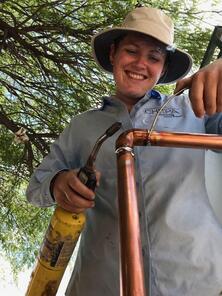 Work at CHRPA looks different every day! Here I am soldering pipes to run a new water line to a clients house, which stopped a water leak. Work at CHRPA looks different every day! Here I am soldering pipes to run a new water line to a clients house, which stopped a water leak. One of my favorite parts of this work placement is the interactions I have with the clients we serve. Its an opportunity to hear stories from their lives. One woman, lets call her Linda, was telling me how she never expected to end up in a place where it was difficult to make ends meet. She is struggling to keep up with bills and find work, and she is also dealing with many health problems. The thing that shocked me while talking to Linda was the incredible amount of love she shows people. She told me of how she cares for her friends and neighbors; two friends who have also been struggling financially are living in her home. She also is housing a friend’s dog that he couldn’t keep at his place. Linda had many stories of how she was looking out for people in her life and helping in any way she could. My first thought was one of wonder. How does she do all this when she doesn’t have much to give? But that didn’t matter to Linda. What mattered was that she was supporting people, in every way she could, to make their lives better. Linda is generous with her time, money, and resources, which is more than I can say about myself. I am not saying I am not generous at all. I give my time and energy to lots of people. If someone asks me to do something for them, it’s pretty likely I’ll do it. But honestly, I am not generous when it comes to gifts. Either physical or monetary gifts. Even though I have an abundance of everything I need, I don’t like to give money, or food, or even possessions in a lot of cases. Its a hard thing for me to do. But why? Part of it is that I like to be prepared financially in case something were to happen where I need that money. What if I need to go to the doctor? What if I need maintenance done on my car? What if? I could what if this to death… But why should I? Did Jesus say about the woman in the temple, “She gave all that she had to live on. Except her savings account. She is saving that just in case she has an emergency.”? NO! He didn’t! I can try so hard to be prepared for anything, but is it worth it if I am not being generous in my everyday life? To me, generosity doesn’t look like only giving money to the offering on Sunday mornings. Sure that is giving to God, but God is in many more places than those pews. What about offering food to my neighbors, giving a woman who is homeless some cash, donating to organizations that are doing good work? And that doesn’t even begin to address all of the giving that I can do with excessive possessions I have… I have the joy of being able to witness generosity every day: Through those of you who have made donations or sacrifices to help me be able to spend this year serving others and through experiences with clients like Linda. 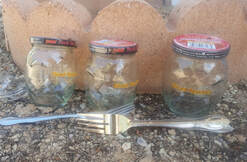 Empty jars of peaches that a client gave to us as a refreshing snack each of the three mornings we were working at her house. They were too delicious to stop eating and take a picture of, so I only got the empty jars. Empty jars of peaches that a client gave to us as a refreshing snack each of the three mornings we were working at her house. They were too delicious to stop eating and take a picture of, so I only got the empty jars. Being generous like Jesus suggested looks like the woman who brought us jars of peaches as a snack each day that we were at her house building an access ramp for her husband. It looks like the mother who said she didn’t have much but wanted to make sure we had food for lunch, so she gave us a bag of snacks to take with us as we left. It looks like a man giving us cold bottles of water on a hot day as we fixed his kitchen sink. Generosity like Jesus wanted is giving when it isn’t expected, required, or easy. I will continue to be humbled and challenged each time a client gives me even the smallest thing because that is giving of themselves and their possessions to a complete stranger. Giving to strangers sounds like what Jesus did. I think it could make the world a little brighter. I want to do that but I’m not good at it, yet. I have so much to learn and thankfully God gives us endless grace as we learn to love better. At Community Home Repair, January and February are referred to as “SOOP Season.” This is in reference to the influx of new volunteers we get during these months through the Mennonite Church’s SOOP* program. Most SOOP volunteers are retired, and spend several months each year away from home, volunteering at a local non-profit. If that sounds a lot like YAV, well, it is! Just this week I went out into the field to make repairs with a SOOP volunteer named Doug. Doug and I are at very different places in our lives. He is now retired, and as we drove to our various jobs, he told me about all the places his career in the medical field took him. Unlike Doug, I am a recent college graduate, have never had a career, and have lived in only a handful of places during my life. Yet here we were, both brought to the desert by our respective churches sharing the common purpose of replacing a water heater and patching a roof. *SOOP used to be an acronym, but following a controversy over the word “senior” to describe such an active bunch, the acronym was dropped. This time of year has been busy at CHRPA for more reasons than simply the greater number of volunteers. I have been working with our Development Director, Carrie Nelson, on creating the inaugural CHRPA newsletter, and it should be launched next week! Additionally, CHRPA’s annual meeting is in two weeks, where we will be debuting another edition of CHRPA Tales. As I mentioned in the blog post “CHRPA Tales,” staff and long-term volunteers are required to write stories about their experiences at work. At each annual meeting, a book is presented containing a collection of stories written during the previous year. I have written a handful of stories, and I included one below from September. I hope you enjoy! Routine MiraclesAs a volunteer who began working at CHRPA in September, it was inevitable that my first month on the job would be filled with cooler repairs. After only several weeks working in the field, cooler repairs were already starting to feel routine. Most followed a similar pattern. You climb up onto the roof, clean or replace a few parts, sweat a lot, and voila, the client has cool air! Yet every once in a while, I come across a client that reminds me there is no such thing as “routine” at CHRPA.
One of the most remarkable client encounters I’ve had was with Diane. Claire and I arrived at her home one morning, and quickly learned that contractors had installed new parts on her cooler several weeks prior. Within minutes of climbing onto her roof and taking off the cooler pads, Claire and I realized the problem. While Diane’s cooler did indeed have new parts, they were installed incorrectly. It took us roughly twenty minutes to reinstall the parts correctly, and immediately, the cooler jumped to life, and Dianne’s home had cool air. When we told Diane the good news, she teared up. With her voice shaking, she explained to us that the temperatures in her home had reached 95 to 100 degrees every afternoon for the past four weeks. One of my greatest joys each day is when I walk into my home after a long sweaty day in the field, and am greeted by a blast of cool air. Diane was deprived of that simple pleasure for almost a month. As I looked around her home, I only saw one small fan. I struggled to imagine a month where your only relief from triple digit heat is a fan the size of a textbook. But now, that was no longer Diane’s reality, she could be comfortable in her own home again. Later that afternoon, when Claire and I arrived back at the office, Kat informed us that Diane had left a voicemail soon after we left. We listened to the message where Diane described how a tall woman and a baby-faced young man (yes, that was me) had brought cool air back to her home and had treated her with kindness and dignity. Some days at CHRPA can be a tiring slog. There are times when you’ve already been up on three roofs during a hot summer day, and the last thing you want is to climb up on another roof to repair another cooler. On those days, repairs can seem routine, or something to get through and move on to the next one. But it is during those moments when I think of Diane, and remind myself that what is our routine job is another person’s miracle. The staff members at Community Home Repair Projects of Arizona (CHRPA), the organization I am serving with during my YAV year, are required to write two stories a month about their experiences providing home repair services to low-income clients. The motivation behind this requirement is CHRPA’s belief that the best way to convey their work and impact to the general public is through the art of storytelling. Each February, our Development Director compiles stories written during the past twelve months into a book called “CHRPA Tales.” As a volunteer, I am not exempt from the two stories a month rule. Therefore, I thought this blog would be a great place to merge my writing for YAV and writing for CHRPA. Periodically, I will publish a story I wrote for CHRPA to give you a better sense of my ongoing work with this organization. Below you will find a story I wrote about a client I visited in September, during my second week as a volunteer. Enjoy! GratitudeNote: All names in this story have been changed for sake of privacy.
How do you respond when someone you have known for merely six hours shows you overwhelming gratitude, especially when you feel that gratitude is unwarranted? That is a question I wrestled with during my second week at CHRPA. For context, I started at CHRPA with no prior experience in home repair. Before this year, the only tools I had ever used were a screwdriver, a hammer, and occasionally, a drill. During my first weeks as a volunteer, I was constantly learning about new tools and new methods of repair, and my head was spinning trying to keep it all straight. The people I worked with were excellent teachers, taking the time to answer my questions and exhibiting patience when I made inevitable mistakes. Still, my lack of prior knowledge meant the amount of help I could actually offer my coworkers on jobs was minimal. I knew this would change and I would eventually find my stride, but at first, I was constantly humbled by how little I knew. Shortly after I began volunteering, I was assigned to assist Kelly with replacing major portions of an air duct in a client’s home. Air ducts were something I admittedly knew little about. I was fairly sure that air travelled through them, and they also seemed to be great places to crawl through buildings undetected in spy movies, but that was the extent of my knowledge. Kelly, on the other hand, has decades of experience in electrical work and a myriad of other fields, so I felt confident that the client and I were in good hands. When we arrived at the home of Leticia and her husband, Diego, she gave us a large, warm smile and immediately offered us coffee and water. Kelly and I got to work and the project took us the entire day. We had to cut out the old ducts, retrofit and trim the new ducts to fit the space, install them, cut out parts of the wall, add new support beams, and clean up the mess we made. Kelly led the way, while I held what needed to be held, cut what needed to be cut, and swept what needed to be swept. I also listened and watched as Kelly explained each step of the process to me. Sure, I helped, but I was not an integral component in bringing back cool air to Leticia and Diego’s home. This fact would not have been evident if you went by Leticia’s reaction. She praised and thanked both Kelly and I throughout the day, telling us how impressed she was by “our” work, and how helpful and smart we were. She went on to explain that this used to be the type of job Diego, who worked in construction for decades, could have done, but age had slowed them both down. She beamed with pride when she recounted how they had both worked hard their entire life to raise a family and maintain their home. Leticia thanked us again as we were leaving, and gave us a bag of homemade tamales, salsa, and candy for the rod. I will admit, Letica’s gratitude made me uncomfortable at several points throughout the day, mainly because I felt it was unearned. Why should she be thanking me? She and her husband were the ones who had worked so hard to provide for their family for so long, and Kelly was the one who had the skills and knowledge to complete the job. There were times during the day when all I was doing was watching and listening. In the moments Leticia thanked me, I would smile and nod, but inside I couldn’t shake this feeling that it was somehow wrong for me to accept her thanks. As Kelly and I were driving back, she told me something that shifted my perspective. She explained that it was fairly common for clients to offer us food or gratitude. She went on on to explain how clients often don’t want to feel like they’re being given a “handout”, and by thanking us or giving us a small token of appreciation, they feel like they’re part of an exchange of goods, not just simply being given something. I can see how this exchange creates dignity on both sides. Leticia felt grateful for our work, and she wanted to share her gratitude with us. By accepting her food and hospitality, we are validating her as a person, and acknowledging that we are not the only ones giving something to her, she is giving something to us as well. Each week I continue to come across clients that display extravagant generosity. While I have developed more confidence in my abilities and knowledge, there is still much I do not know, and I constantly have to rely on the wisdom and experience of the volunteers and staff around me to complete jobs. One thing I do know now is how to respond when a client shows gratitude towards me, whether it was earned or unearned: a smile and a “you’re welcome”.  Adrian Beltre. He is not relevant to this post, but he is a great baseball player nonetheless. Adrian Beltre. He is not relevant to this post, but he is a great baseball player nonetheless. It’s October, which means playoff baseball! I started following the sport when I was eight, and it has been a huge part of my life ever since. A remarkable trait of baseball is its consistency. The game has been played in essentially the same form for over a century. This consistency can be a great comfort in a world that is changing rapidly on a micro and macro level. Whether I am watching a baseball game on the TV of my childhood home, in a dorm room with friends, or on my laptop in the YAV house in Tucson, it is the same game. Occasionally during a baseball game, the players will toss the ball around the horn. This is when the infielders toss the ball amongst themselves after a strikeout occurred with no men on base. The primary purpose of the exercise is to keep the fielders loose during the inning. In honor of playoff baseball, I thought I would use this blog post to go around the horn, and do a brief check in with three components of my life as a Tucson Borderlands Young Adult Volunteer: Faith, Work, and Community. FaithThis Sunday, we completed our Southern Arizona church tour! Our site coordinator, Alison, arranged for us to visit various churches across the Tucson area during our first month and a half as YAVs. Our house visited Trinity, Southside, St. Mark’s, Holy Way, St. John on the Desert, and Mountain Shadows Presbyterian Church. The purpose of these visits were to introduce us to the various Presbyterian worshipping communities in the Tucson area, connecting us with the wider faith community we are a part of in this city. Each church was unique, but the one thing they all shared was radical hospitality. We introduced ourselves to the congregations, and they responded with warmth, curiosity, and joy. Now that we are done visiting churches as a group, each YAV will choose their own worshipping community to be a part of. While I have not made up my mind where I will worship, I know I will be fully welcomed wherever I choose. WorkI am now a month into my work at Community Home Repair Projects of Southern Arizona. As the seasons change, we have less and less cooler repairs, but our work of fixing roofs, plumbing, flooring, electricity, and everything in between continues. The cooler weather has transformed my morning commute by bike. What used to be a hot and sweaty slog is now a cool and breezy ride. I have also started to split my time between working in the field and in the office. Two days of the week I am out making repairs, and the other two days I am in the office helping CHRPA’s Development Director, Carrie, with various tasks ranging from grant writing to data entry. This past thursday, I worked on and submitted my first grant for CHRPA to Wells Fargo! CommunityOne realization I have recently come upon is that being a YAV is not merely being a part of one community, it is being a part of many communities. Over the past month, I have began to form communities with my housemates, co-workers, church congregants, and Tucson residents. The community that I have the most interactions with is our YAV house. We have known each other for over two months now. This means we have a degree of comfort with each other, and can laugh together, dive into deep topics together, and, sometimes, disagree together. It has been a rewarding experience to get to know Ryan, Miranda, and Dakota, and to hear their fears, realize their strengths, and appreciate their senses of humor. And yes, I realize I included my wife in that list. Despite having known her before YAV, this experience has taught me even more about her, mainly just how much strength, resilience and compassion she has within her. Thank you for going around the horn with me. As the year goes on, I will try to occasionally do this exercise to continue to give you a sense of the life of a Tucson YAV.
Peace, Tanner 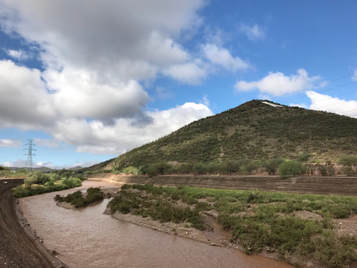 Picture taken of Santa Cruz River on September 20th Picture taken of Santa Cruz River on September 20th My year as a Young Adult Volunteer (YAV) in Tucson, Arizona is officially underway. These past three weeks have been filled with a mix of joys, challenges, and everything in between. Yet one common thread that has defined my time here thus far is firsts. As a YAV in Tucson, I have experienced foreign and new situations on an almost daily basis. Below, I will reflect on some of my most significant firsts during my brief time here. First Time in a Desert During my first few days of exploring Tucson, a thought kept running through my head: “where is the green in this barren city?” Coming from a city of trees and manicured lawns, the site of dirt and gravel stretching in all directions was a stark change. Upon looking at a map of the city on my phone, I noticed several blue lines running through Tucson. Recalling the rivers and watering holes that dotted the Central Texas landscape, I was eager to see a splash of blue in the desert. However, every time I rode over one of those blue lines on my bike, I found that they were simply dry creek beds, and water only runs through them a few times a year. It was during these moments that I fully began to understand just how different of a place I had entered into. Three weeks in, and I still sometimes miss the site of grass or a flowing river, but I am no longer think of Tucson as “barren.” The city is abound with various types of wildlife, flora, and natural splendor. It is simply different than where I came from. Then, just today, I drove over a fully running river. It was full from a day of rain, and was strikingly beautiful against the backdrop of the rugged desert landscape. As my time here progresses, I hope to continue to find beauty in the desert. 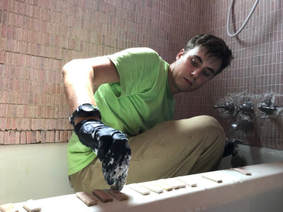 laying tile! laying tile! First Time at CHRPA For several weeks now, I have worked as a volunteer for Community Home Repair Projects of Arizona. This organization provides free emergency home repairs and handicap modifications to low-income and elderly residents of the Tucson area. As I have no previous handy-man or construction experience, everyday at CHRPA brings a new first. So far, I have had to learn how to fix a cooler, build a wheelchair ramp, replace a toilet, install a new sink faucet, and put in a door. Other new experiences this job has brought about include waking up before the sun rises, biking to work, and riding the bus. To say I am out of my element would be an understatement. It is hard work, and sometimes I feel like I get in the way more than I help when making a repair. I also find myself tired, sore, and most of all, hot. All this being said, I am amazed at the knowledge and passion of my coworkers and the lengths they go to in order to help the residents of Tucson. I have only begun to see the impact CHRPA has on people’s lives, and while it is difficult work that often leaves me frustrated, I feel proud to be part of this organization. First Time at an Immigration Shelter During our first week in the city, the Tucson YAV house volunteered with the Inn Project. The project is run through First United Methodist Church of Tucson, and provides a shelter for primarily Central American asylum seekers recently released from detention. Most refugees stay in the shelter before going on to their families in the United States who they will be staying with while their asylum application is processed.The shelter is set up in the church’s basement, and provides individuals with a place to sleep, three meals a day, and food and water for their upcoming journey. On the day we volunteered, 42 individuals were residing at the shelter. Immigration is an issue that I have learned about primarily through my wife, Dakota, who has worked extensively with immigrant communities through various non-profits. However, this was my first time being face to face with people who had just been released from immigration detention facilities. With my limited Spanish, I struggled to communicate effectively with those we were helping, but all expressed immense gratitude towards us for volunteering. Most were families, and all seemed tired yet excited to soon have the opportunity to see their family in the United States. As I was leaving, I had the feeling that if more people could spend a few hours with those most impacted by our immigration system, the debate surrounding immigration would be quite different. First Time Fixing a Flat Tire Finally, I fixed my first ever flat tire on a bike during this past three weeks. In fact, I fixed my first nearly two weeks ago, and have since had to fix four more flats. With a plethora of thorny plants and frequent potholes, Tucson may well by the flat bike tire capital of the United States. These flat tires shattered my vision of what community by bike would be like. Before I started as a YAV, I had an hour round trip commute in my car, and I was eager to trade driving for the simplicity and free exercise that come with biking. It turns out, bikes are not the simplest of machines to maintain, and just like a car, regular maintenance is required. On one particularly hot day, I found myself changing a flat tire on the side of a busy street. At that moment, all I wanted was my car, which happens to be sitting with my parents a thousand miles away. The very next day however, I found myself biking to work with a repaired tire, a cool morning breeze in my face, and a view of the sun rising over the Tucson mountains. Often during these past three weeks, the experiences that have brought me the most frustration and the most joy have been one in the same. Thank you for taking the time to read this post! Have a great weekend and stay cool. Peace, Tanner “Oh, no! Honey, I prayed to God last night that you wouldn’t be back here.”
This is not the way that I’d expect to be greeted by a client on my second day at the same job. But she didn’t mean it the way it sounds out of context. Vern and I arrived on a Thursday to a little trailer up on a hill with a wide view of the Tucson Mountains. We were investigating a water leak which was pouring into the void at forty gallons an hour. It was a bit of a mystery, as there was no obvious outpouring or plant growth except for where gray water drained into the yard. But the main line ran from the meter, up the pitted, rocky driveway, and under the trailer all the way to the far side, where it connected to the house and then ran to the water heater on the street side. The leak could have been anywhere or in multiple places but it was certainly nowhere obvious. Just to ensure it wasn’t in the pipes under the house we could access, because I heard running water, and also because I wanted to, I decided it would be best to take some skirting off and go investigate with a flashlight. It was dark and moist under there from ages-old drips coming from some of the drain lines, but on the street side at least there was plenty of crawling room so I explored about to the middle of the house until I could be sure that those lines weren’t pouring the forty gallons an hour. There were, however, a few droplets coming steadily from the calcified old plastic piping to the bathrooms, leading me to believe it would be best to replumb the whole house. As I was coming out, I heard Ms. Willard – as her friend Dave, who greeted us initially, called her – yelling at Vern. “You let that baby girl crawl under my trailer?!” She was leaning her head out the bedroom window which overlooked our workspace and stared at me in shock and disbelief as I came out unscathed and unconcerned. “I do this all the time,” I said with a shrug and nonchalant smile. She shook her head at me. Vern and I started to dig for the waterline, and ended up with almost an eight-foot trench (“maybe it’s just a little further this way…”). I threw my jacket off as the sun shone strong on our shoulders. Ms. Willard came out with coffee and observed me heaving massive piles of red dirt around in her yard. “How did you get into this sort of work?” she asked me. “I volunteered.” I grinned to show her I was having fun and kept digging. Vern asked her for a wire coat hanger and cut it into two rods to try and locate the waterline. I was delighted at the opportunity to use witchcraft at work. We found the waterline in the exact center of the house, barely six inches underground and making our sixteen-inch-deep trench feel quite silly. It was ancient and encased in rusty flakes that chipped off at the slightest touch, destroying our initial idea of attaching it to the near side of the trailer and bypassing the busted part. The whole thing was begging for death. When I told Ms. Willard we would be back the next day and collected all the necessary documents, she asked, “So I’m approved, then?” “Of course,” I said, not even realizing that was a question. She hugged me out of relief. She’d been putting up with having her water off for two weeks by the time we came, and plumbers had estimated the cost of repairs at thousands of dollars. When Albert, Vern, and I came back on Monday to get the real business done, aside from expressing her wish that I wasn’t there to endanger myself again, Ms. Willard offered us coffee and homemade banana bread. “I just couldn’t sleep last night worrying about this,” she said, “so I made this to help me calm down.” I did my part in being the smallest and youngest person there and helped Albert repipe under the trailer while Vern dug the trench alongside the old waterline. Ms. Willard was not pleased about this. “Where’s your mask?” she demanded. I fetched a dust mask from the car. “Tie your hair up in a bun so it doesn’t get stuff in it! Put this bandana around it. Wear this jacket.” “I’m not even going under at this point,” I protested, as I passed Albert, who was lying under the house, a new coupling. There was considerably less room to wiggle on the far side, and he was using bits of skirting and scrap plywood as a bed. I considered it distinctly unfair that she’d let Albert go under with just a T-shirt. “Put the damn jacket on!” When it was my turn to bring the main new Pex lines towards the back of the trailer I became more grateful for the jacket. A fact about pack rats that I didn’t know before is that they store cacti in insulation, eat the cacti, and leave the spines. They had been doing that under this house for years. I’m no stranger to cactus spines at this point, but it’s been a week and I am still finding them in my body. In a quieter moment I crouched on the bathroom floor, inside, next to a hole I’d drilled and waited for Albert to send me the new toilet supply line. Ms. Willard waited with me. “I’m sorry I’m so distracted and not much help today,” she said suddenly, and I looked up to realize she had tears running down her cheeks. “I just was waiting on this doctor’s appointment, and now my paperwork hasn’t been processed and I don’t know if I have cancer in my throat, too, and all this…” A reason I like CHRPA is that usually I am faced with problems I can fix. This was not one of them. “I’m so sorry,” I said. I set the drill down. “Do you want a hug?” She did. I patted her back and held her. “I keep telling all these women in my life to be strong,” she said. “Now I gotta do that, too.” Her daughters came to visit that day, as did her twelve-year-old granddaughter, who helped pull up the kitchen supply lines. Ms. Willard pointed at me and bragged to her granddaughter. “See this girl?” she said. “She’s been crawling under that house all day, with all those spiders and whatnot!” I waved to her on my way out the door. Vern, a champion among champions, dug the entire trench himself. Every time I’d go back to the truck to get something he would be a few feet closer to the meter, swinging a pickaxe non-stop. By the end of the day he was done, and so were we. We left it nearly ready to be hooked in. I was not assigned to go back the next day and see the final result. Ms. Willard made me keep the jacket and bandana. I will not forget about her and I hope that our work relieved some part of the heavy burden on her shoulders that kept her up at night, baking banana bread. |
Archives
November 2023
Categories
All
|
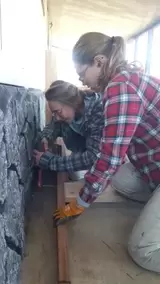
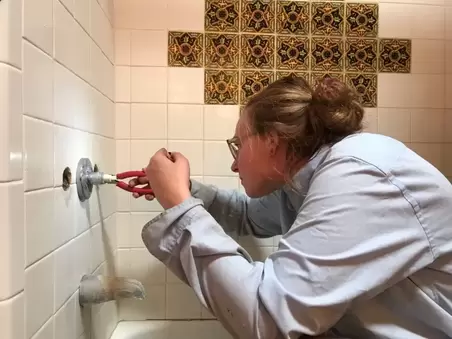
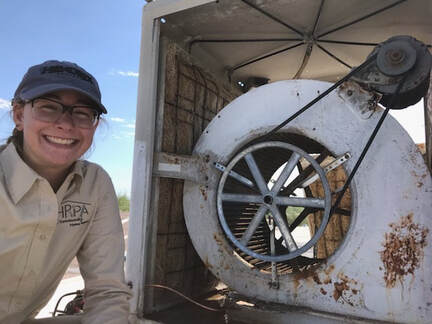
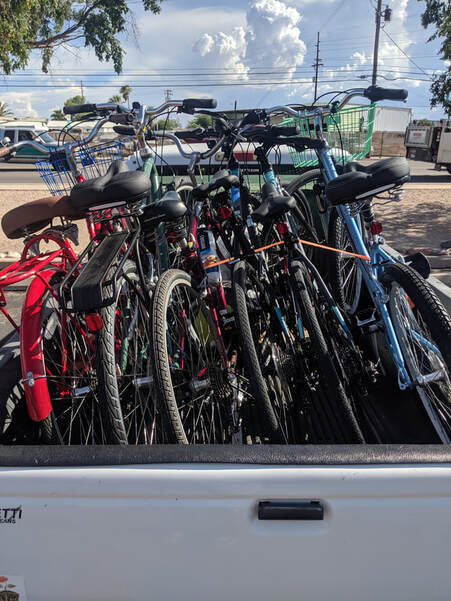
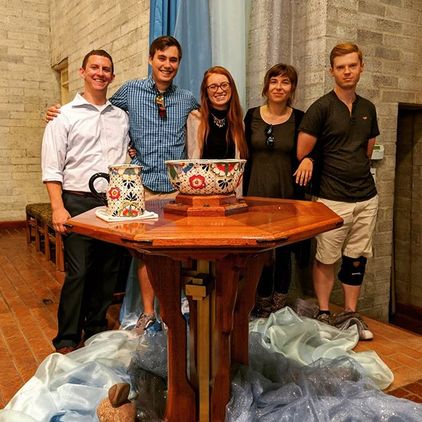
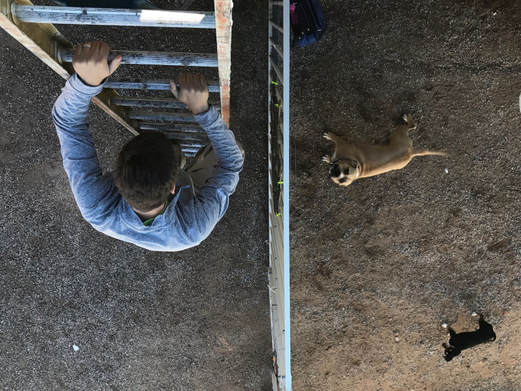
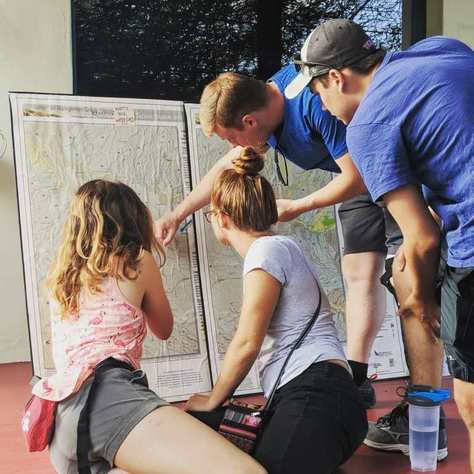
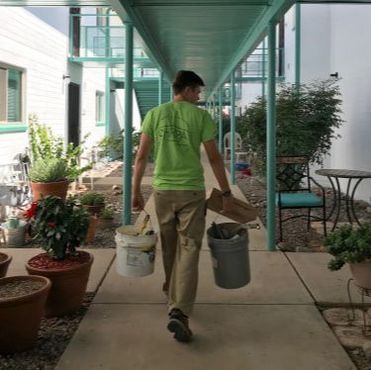
 RSS Feed
RSS Feed
